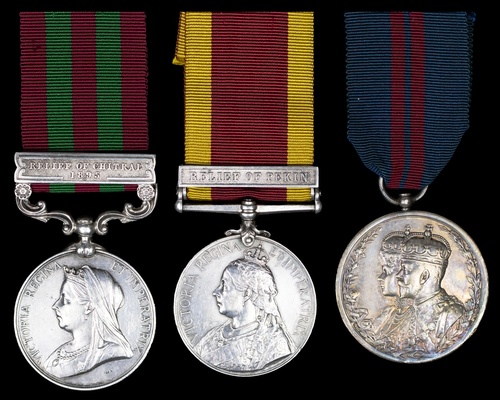
Auction: 25111 - Orders, Decorations and Medals - e-Auction
Lot: 416
An interesting Victorian campaign group of three awarded to Colonel C. H. Selwyn, C.B., Indian Army, a distinguished Bengal Lancer who won a 'mention' for his command of a police force in Pekin during the Boxer Rebellion
Rallying to the common cause come the Great War, he served as a driver for the French Red Cross and on the staff in Russia in 1919-20, where his linguistic skills no doubt found favour
India General Service 1895-1902, 1 clasp, Relief of Chitral 1895 (Capt. C. H. Selwyn, 11th Bl. Lancers); China 1900, 1 clasp, Relief of Pekin (Captn. C. H. Selwyn, 12th Bl. Cavy.); Delhi Durbar 1911, silver, unnamed, minor contact marks, very fine and better (3)
Provenance:
D.N.W., 4 December 2008, when sold with a U.S.A. Military Order of the Dragon and without the Delhi Durbar.
[C.B.] London Gazette 6 February 1917.Charles Henry Selwyn was born in Bradford, Yorkshire on 1 March 1863, the son of Julius and Sophie Schlesinger; Charles changed his surname to Selwyn in 1893.
Commissioned in the Connaught Rangers on 25 August 1883, he transferred to the Indian Army in December 1886, soon after which he was employed in the Burma operations with the 18th Bengal Infantry (Medal & 2 clasps). Subsequently appointed a Squadron Officer in the 12th Bengal Cavalry - and having then been advanced to Captain in August 1894 - he was attached to the 11th Bengal Lancers (Probyn's Horse) during the relief of Chitral operations in 1895, in which the regiment participated in a number of actions.
Later that year, Selwyn was appointed a Staff Captain in the Intelligence Department of the Indian Army, followed by service as an Assistant Secretary in the Government of India Military Department. And it was in the latter role that he was employed as a Special Service Officer in China in the period July-December 1900, an appointment no doubt prompted by his linguistic skills, which included Chinese, German and Russian. Indeed, he was specifically employed as a member of an International Commission to promote harmonious relations between the assorted Allied contingents.
But Selwyn also played his part in active operations and established a police force in Pekin, a feat to which Sir Claude McDonald - the hero of the defence of the Legations - referred to in a letter home: 'In the south-west corner of the 'Tartar' city, inhabited by Mandarins and high officials, an efficient police service has been organised under Captain Selwyn of the Bengal Lancers.' In that respect - and working alongside a fellow Indian Army officer - Selwyn had command of 20 soldiers, 60 natives and six Chinese officials. Both men were duly mentioned in despatches:
'Captains C. H. Selwyn and G. de S. Barrow, Indian Staff Corps, Special Service Officers, have been employed since the occupation of Pekin as police officers in charge of portions of the city under British control. They have performed their duties with tact and discretion and fully maintained the British reputation for justice and good government.' (London Gazette 14 May 1901, refers).
Selwyn was advanced to Major in August 1901 and was afterwards employed as a Field Intelligence Officer on the staff at Shanghai.
Back in India, one of his first appointments was as Deputy Assistant Adjutant-General in the Peshawar Division, but he returned to regimental duty in November 1906, when he was appointed Squadron Commander and 2nd-in-Command of the 12th Bengal Cavalry. Having then been advanced to Lieutenant-Colonel in August 1909, he was appointed Commandant of the 28th Light Cavalry in January 1911.
Come the outbreak of hostilities in August 1914, Selwyn appears to have been on extended furlough back in the U.K. And he appears to have been employed at the India Office in London and as a member of the committee that approved of the issuance of official memorial plaques to the next of kin of the fallen. He also - rather gamely - served as a driver in the French Red Cross in the period February to August 1918, and out in Russia as a Colonel on the staff in 1919-20, where his linguistic skill no doubt found favour and was entitled to a British War and Victory Medal Pair.
Selwyn died in Germany in 1927, but not before instilling in his daughter Robina his skills as an ex-Bengal Lancer:
'It seems that the modern girl is not yet content with her successful invasion of most of the professions but must always be finding new outlets for her enthusiasm.
The latest example may be seen at the International Horse Show at Olympia where one of the most popular features is the spectacle introducing the historical coaches and a hold-up by highwaymen.
This has been written and produced by the daughter of the well-known Colonel Selwyn, who commanded the Bengal Lancers. This young lady, who is well-known on films by the name of Robina Maughan, has made a reputation as a fearless and accomplished horsewoman. It is only by the merest chance that she was given the opportunity of her merit as director.'
So stated a report in the Lincolnshire Echo on 27 June 1931.
Subject to 20% VAT on Buyer’s Premium. For more information please view Terms and Conditions for Buyers.
Sold for
£800
Starting price
£320




